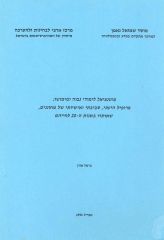This report describes a research project by the National Institute for Examinations and Evaluation, commissioned by the Samuel Neaman Institute on the subject of follow-up on gifted pupils found through their achievements in the psychometric examinations.
The research describes a profile of achievements, environmental background and personality characteristics of the gifted with high learning potential.
The definition of giftedness relied on the relative achievements in the inter-university psychometric entrance examination taken by the examinees in the years 1984 and 1985, prior to their academic studies. The research included 456 examinees with a general psychometric grade who were in the upper percentile (1%) in the said years, as well as a control group of 750 with normal ability, who were randomly sampled from the rest of the ability range. The follow up was performed during 1992-1993 and was based on a detailed questionnaire that asked for details about the family, the economic and educational background at home, history of enrichment and cultivation, learning and occupational achievements, military service, professional and occupational tendencies, personality characteristics and self image, mental and social adaptation, etc.
Research questions touched on the measure of stability of the giftedness from childhood to maturity, and indirectly one can learn from it about the reliability of the definition of the trait; the measure of fulfillment of the intellectual potential, in the areas of studies, army and employment, and indirectly – one can learn from this about the validity of the definition of giftedness; about the non-intellectual characterization of the gifted and a possible explanation (personality wise) for cases of non fulfillment.
The findings of this research show that scholastic giftedness is quite stable in time from childhood to maturity: 71% of those who have been found to be gifted in their childhood were also defined as such (see definition above) during their maturity.
The definition of giftedness (through objective examinations) proves a good predictive ability of future learning and occupational achievements, i.e., advantage for the gifted compared to those with normal abilities. This advantage exists in high school and university grades, in the number of those continuing their graduate studies, in the amount of scholarships, prizes, and publications later on, in the selectivity of army roles and even in the wage level as reported at the time of the research.
Among the characteristics that distinguishes the gifted are: a majority of boys among them (80%), very marked tendency for preference (and stable throughout their lives) of realistic and technological areas, a strong socio-economic background (especially the parents’ education), supportive and encouraging environment during childhood, and a lesser social inclination (involvement, interest, social self confidence). Among the main reasons for non-fulfillment of potential offered by the gifted was laziness, lack of persistence, lack of talent to exploit opportunities. The gifted expressed great esteem for the contribution of the enrichment groups to their intellectual development. As for occupational motivation – the gifted place creativeness and originality high on their preference list (compared to control, influence, and economic security).
While the gifted see themselves as being luckier than those with normal ability, no difference was found between them in the degree to which they consider themselves to be happy.












